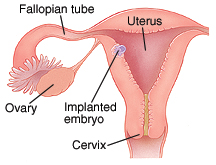Bleeding During Early Pregnancy
If you've had bleeding early in your pregnancy, you're not alone. Many other pregnant women have had early bleeding, too. And in most cases, nothing is wrong. But your healthcare provider still needs to know about it. He or she may want to do tests to find out why you're bleeding. Call your healthcare provider if you notice bleeding during pregnancy.

Bleeding may occur when the embryo implants on the uterine wall a week or two after fertilization.
What Causes Early Bleeding?
The cause of bleeding early in pregnancy is often unknown. But many factors early on in pregnancy, such as sexual intercourse, may lead to bleeding. Here are some other causes:
If You Notice Spotting
Spotting (very light bleeding) is the most common type of bleeding in early pregnancy. If you notice it, call your healthcare provider. Chances are, he or she will tell you that you can care for yourself at home. You may need to:

Ultrasound can help check the health of your fetus.
If Tests Are Needed
Depending on how much you bleed, your doctor or other healthcare provider may ask you to come in for some tests. A pelvic exam, for instance, can help see how far along your pregnancy is. You also may have an ultrasound or a Doppler test. These imaging tests use sound waves to check the health of your fetus. The ultrasound may be done on your belly or inside your vagina. Your doctor also may order a special blood test. This test compares your hormone levels in blood samples taken 2 days apart. The results can show how long you've been pregnant.
Warning Signs
If your bleeding doesn't stop or if you notice any of the following, seek medical help right away:
-
Soaking a sanitary pad each hour
-
Bleeding like you're having a period
-
Cramping or severe abdominal pain
-
Feeling dizzy or faint
-
Tissue passing through your vagina
-
Bleeding at any time after the first trimester
Questions You May Be Asked
Though not normal, bleeding early in pregnancy is common. If you've noticed any bleeding, you may be concerned. But keep in mind that bleeding alone doesn't mean something is wrong. Call your healthcare provider right away, though. He or she may ask you questions like these to help find the cause of your bleeding:
-
When did your bleeding start?
-
Is your bleeding very light (spotting) or is it like a period?
-
Is the blood bright red or brownish?
-
Have you had sexual intercourse recently?
-
Have you had pain or cramping?
-
Have you felt dizzy or faint?
Monitoring Your Pregnancy
Bleeding will often stop as quickly as it began. Your pregnancy will likely go on a normal path again. You may need to make a few extra prenatal visits. But you and your baby will most likely be fine.

